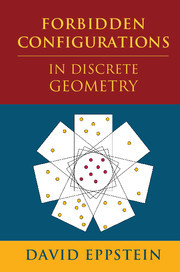
Forbidden Configurations in Discrete Geometry
- Publisher's listprice GBP 38.00
-
18 154 Ft (17 290 Ft + 5% VAT)
The price is estimated because at the time of ordering we do not know what conversion rates will apply to HUF / product currency when the book arrives. In case HUF is weaker, the price increases slightly, in case HUF is stronger, the price goes lower slightly.
- Discount 10% (cc. 1 815 Ft off)
- Discounted price 16 339 Ft (15 561 Ft + 5% VAT)
Subcribe now and take benefit of a favourable price.
Subscribe
18 154 Ft

Availability
Estimated delivery time: In stock at the publisher, but not at Prospero's office. Delivery time approx. 3-5 weeks.
Not in stock at Prospero.
Why don't you give exact delivery time?
Delivery time is estimated on our previous experiences. We give estimations only, because we order from outside Hungary, and the delivery time mainly depends on how quickly the publisher supplies the book. Faster or slower deliveries both happen, but we do our best to supply as quickly as possible.
Product details:
- Publisher Cambridge University Press
- Date of Publication 17 May 2018
- ISBN 9781108439138
- Binding Paperback
- No. of pages238 pages
- Size 228x152x10 mm
- Weight 460 g
- Language English 0
Categories
Short description:
Unifies discrete and computational geometry by using forbidden patterns of points to characterize many of its problems.
MoreLong description:
This book surveys the mathematical and computational properties of finite sets of points in the plane, covering recent breakthroughs on important problems in discrete geometry, and listing many open problems. It unifies these mathematical and computational views using forbidden configurations, which are patterns that cannot appear in sets with a given property, and explores the implications of this unified view. Written with minimal prerequisites and featuring plenty of figures, this engaging book will be of interest to undergraduate students and researchers in mathematics and computer science. Most topics are introduced with a related puzzle or brain-teaser. The topics range from abstract issues of collinearity, convexity, and general position to more applied areas including robust statistical estimation and network visualization, with connections to related areas of mathematics including number theory, graph theory, and the theory of permutation patterns. Pseudocode is included for many algorithms that compute properties of point sets.
'David Eppstein has managed to unify a huge swath of research on planar point sets through monotone properties and forbidden configurations. For example, finding grid points that avoid the obstacle of a 3-point line is a century-old problem still not entirely resolved. The author's unification naturally uncovers research lacuna, several of which he fills, while others are formulated as sharp new open problems. This rare synthesis of previous work will reinvigorate and redirect the field.' Joseph O'Rourke, Smith College, Massachusetts
Table of Contents:
1. A happy ending; 2. Overview; 3. Configurations; 4. Subconfigurations; 5. Properties, parameters, and obstacles; 6. Computing with configurations; 7. Complexity theory; 8. Collinearity; 9. General position; 10. General-position partitions; 11. Convexity; 12. More on convexity; 13. Integer realizations; 14. Stretched permutations; 15. Configurations from graphs; 16. Universality; 17. Stabbing; 18. The big picture.
More




